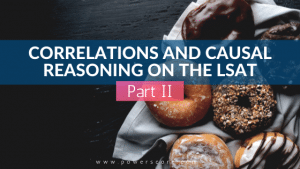Are you taking the LSAT in Israel? Students take the LSAT if they plan to attend law schools in the US and Canada. However, the test administers across the globe. Check out this post about taking the LSAT abroad.In Israel, only one location offers the LSAT: Tel Aviv at the Zoa House. Isreal is also the only country where they administer the LSAT on Mondays exclusively. They offer it four times a year: February, June, September/October, and … [Read more...]
Are You There, Test Taker? It’s Me, the LSAT
A great way to learn about what's important to someone is to see how they spend limited resources. This is just as true about the LSAT test-makers as anyone else. But we're so accustomed to answering the questions they ask us. We don't stop to listen to what they have to say about the test. The Purpose of the LSAT We know that LSAC puts a lot of time and money into creating each test. Those are limited resources. It's reasonable, then, for us … [Read more...]
Grouping Games, Conditional Linkage, and the Double-Not Arrow
A commonly-tested occurrence in Grouping Games (and even occasionally in Logical Reasoning) is a set of conditional rules that can be linked to one another through shared variables, forming chains and producing a series of inferences. The ability to create and manipulate these linkages is critical, as is the ability to avoid mistakes!In this LSAT Forum Post of the Day, PowerScore VP of Development Jon Denning walks a student through the … [Read more...]
Correlations and Causal Reasoning on the LSAT Part II
This is the second article in a series that discusses Correlations and Causal Reasoning on the LSAT. Here is a typical stimulus containing a causal conclusion supported by a correlation. Advertisement: Pump3D is a nutritional supplement that can greatly reduce athletes’ fatigue after anaerobic exercise. This was shown by a study investigating the relationship between fatigue and high doses of guarana extract—the main ingredient in Pump3D which … [Read more...]
When and How to Ask for Letters of Recommendation
Highly-regarded law school admissions expert, Peg Cheng, is the author of The No B.S. Guides for applying to law school and the founder of Prelaw Guru, where you can find law school admissions tips, videos, books, and more.Because fall always seems so busy for everyone, I recommend asking for letters of recommendation (LORs) for your law school application during the summer, September at the latest.Make an effort to meet with each … [Read more...]
The Benefits of Failure: Turning LSAT Fails into Positives
Over in the PowerScore LSAT Discussion Forum, I've been talking with one of our students about confidence. I often write about the necessity of a positive mental outlook and of believing in yourself, and this student was concerned about a few recent practice test scores that were a few points below average. As I've discussed elsewhere, there's an element of randomness to the composition of each LSAT, and that variation affects your results so you … [Read more...]
GPA Addenda Effectiveness Against the T14
We're now entering application season, and one question that often comes up is at this time of year is: should I submit an addendum to explain my low GPA or LSAT score? And if so, how long should it be? Our resident law school admissions expert, Dave Killoran, talks with a student about her addendum, and provides some handy rules for putting together an explanation. Here's a quick preview. Make sure to check out the full thread to read the … [Read more...]
Taking the LSAT in Norway
Are you taking the LSAT in Norway? Students take the LSAT if they plan to attend law schools in the US and Canada. However, the test administers across the globe. Check out this post about taking the LSAT abroad.In Norway, only one location offers the LSAT: Moss, The American College of Norway. While there is just one location option, it occurs twice per year: September/October and December. You can find a complete list of test dates and … [Read more...]
Logic Games Language and Numerical Distributions
The test makers are notoriously clever when it comes to the interplay of variable sets in Logic Games, particularly with how they word the rules and restrictions governing distributions. So how can you prepare yourself for this challenge, and what methods can be used to "test" the limits of variable interactions?Today's LSAT Forum Post of the Day addresses both of these concerns, as PowerScore Developer Jon Denning explores exactly what to … [Read more...]
Cannot Be True Questions and Conditional Reasoning
Cannot Be True questions in Logical Reasoning occasionally feature conditional reasoning (reasoning that uses sufficient and necessary conditions). Some of those questions can appear to be extremely difficult.As today's LSAT Forum Post of the Day shows, these questions often revolve around the same error. The test makers just dress it up a bit differently each time in order to throw off unsuspecting test takers. PowerScore LSAT Logical … [Read more...]
How NOT to Weaken Logical Reasoning Arguments
Here's an example of a highly misleading strategy for attacking Logical Reasoning Arguments. To weaken an argument, you must first find the central assumption of the argument and then attack it by using additional evidence that refutes that assumption.Let's Break It Down Where to begin? Conceptually, this advice is quite deceptive. Not every argument contains exactly one "central assumption". In fact, most arguments contain multiple … [Read more...]
Which LSAT Has the Toughest Curve?
Everyone and their mother takes the test in September. The fall test administrations are so popular that many students are afraid the curve is much tougher as a result. However, you shouldn't worry about a "tougher curve," because it doesn't matter how popular the test is. Let me explain. LSAT Scoring Contrary to popular belief, the LSAT is not graded on a curve! At least, not in the traditional sense of the word. In a typical college or law … [Read more...]
How to Guess Like a Pro on the LSAT Part III: Reading Comprehension
If you're going to be guessing on any LSAT questions, it will probably be on Reading Comprehension questions. Why? Because there are more questions in the Reading Comprehension section (27-28) than in any other section of the test. Moreover, it's no secret that the complexity of the passages you will be dealing with has increased over the years, with some of the latest RC sections bordering on brutal.While there is no penalty for guessing, … [Read more...]
Either/Or and the Double Arrow
Confused by the use of the use of the phrase "either/or" in LSAT questions? You aren't alone! And, you might be even more confused when the phrase "but not both" is thrown into the mix.Dave Killoran breaks down how "either/or" works on the LSAT to a student on our LSAT Forum, and discusses the effects of the "but not both" phrasing when it is used (tip: it has a big effect). Since this phrase appears most frequently in Logic Games, you have … [Read more...]









